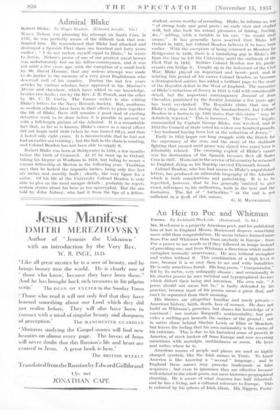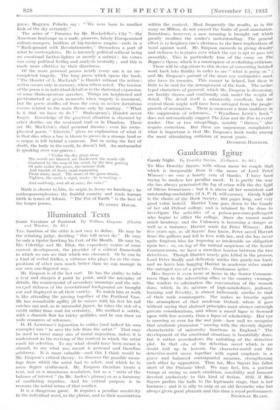An Heir to Poe and Whitman
Poems. By Archibald MacLoish. (Boriswood. 7s. 6d.) Ma. MaeLmsn is a properly American poet, and for publishing him at last in England Messrs. Boriswood deserve something more solid than congratulation. He seems tOhave learned more from Poe and Whitman than from anybody in Europe : froni Poe a power to use words as if they followed an image instead of providing one, and from Whitman a directness which makes metaphor normally unnecessary. He sees without metaphor and writes without it. This combination at a high level is rare, because it is so easy then to see and write banalities. He is only sometimes banal. His long poem, " Conquistador," fell by its metre, very unhappily chosen ; and occasionally-in his shorter poems he uses metrical and typographical devices which distort their being and intention. His own rule, " A poem should not mean but be," is badly defended by his practice, because most of his poems mean a great deal, and can't be separated from their meaning.
His themes are altogether familiar and rarely private—. American history, birth, death, love of women. He does not build on Whitman's promises, but shares his knowledge of a continent nor- imitate Zangwill's sentinientality, but pro- vides a melting-pot beneath the surface of the:ground ; nor in satire chase behind Sinclair Lewis or Eliot or Mencken, but leaves the feeling that his own nationality is the centre of his criticism. This is due to his historical sense of growth in America, of stock broken off from Europe and now reverting sometimes with nostalgia, snobbishness or scorn. He lives and writes where he is.
American names of people and places are used as highly charged symbols, like the Irish names in Yeats. To know America is like knowing a " second ": language ; and in England these names may provoke inadequate or false responses ; but even to ignorance they are effective because well-related to the whole poem, not mere historico-geographical chanting. is aware of what America has half inherited, and he has a living, not a cultured reference to Europe. This 4 enforced by his echoes of Irish. idiom. His Niggers, Portu-
guese, Magyars, Polacks say : "We were born to another look of the sky certainly."
The series of " Frescoes for Mr. Rockefeller's City "—the
American landscape as a nude; pioneers; falsely Europeanised
-culture-mongers, .builders_ of big-business empire—ends in a ." Back-ground with Revolutionaries." themselves a part of NI-hat he contemplates. He is intensely political without being in emotional faction-fighter or merely a satirist : his verses..
tan carry political feeling and analysis neutrally ; and this is made more effective by their directness.
Of the more personal poems nearly every one is an un- tompleted tragedy. The • long poem which opens the book, ." The Hamlet of A. MacLeish" is Hamlet without the action :'L .action occurs only in memory, when others acted. The tension., of the poem is in individual detail or in the rhetorical expansion of sonic Shakespearean speeches. Things are heightened and • particularised at given moments when tragedy is imminent,- but the poem shuffles off from the crisis to review fortuitous events related to the main theme only by analOgy. " What is it that we . have to do ? " Shakespeare's Hamlet never. forgot. Knowledge of the practical situation is obscured by -other deaths—on the westward trail or in Flanders. These: arc Mr. MacLeish's chief personal themes : even his meta-, 'physical poem, " Einstein," gives no explanation of what if is that dies when a boy is blown to pieces in a strange land or a corpse is left behind a caravan. But in seeing the fact of death, the body in the earth, he doesn't fail. An ambassador is speaking over war-graves : " Under the dry grass stein
The words are blurred, are thickened, the words sift Confused by the rasp of the wind, by the thin grating Of ants under the grass, the minute shift • And tumble of dusty sand separating
From dusty sand. The roots of the grass strain, Tighten, the earth is rigid, waits—he is waiting—
And suddenly, and all at once, the rain !"
Birth is clearer to him, its origin in decay no handicap : he rmthropomorphosises the fruitful country and reads human birth in terms of Adonis. " The Pot of Earth " is the best of the longer poems.IIL:nr1IItYHoust.











































 Previous page
Previous page